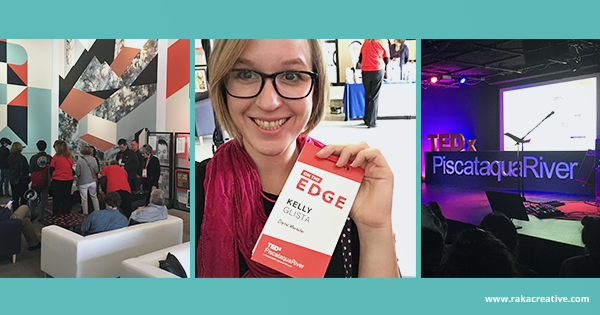After years of watching TED talks on YouTube, I went to my first TEDx conference May 6 at 3S Artspace here in Portsmouth, NH and man, was it cool. I mean, seriously, intensely cool. The speakers, the musicians, the art exhibits, and a tech playground where you could play with virtual reality? So. Very. Cool.
Sure, I expected cool. I expected inspiration. I expected awesome snacks.
But what I didn’t expect was to spend most of the day thinking about work.
I’m an inbound content writer. I spend most of my days writing blog posts or articles for clients in a variety of fields for content marketing purposes, and sometimes I struggle to find ways to make the writing compelling.
But here’s the thing—and it’s something I have to remind myself of constantly—it’s not that the content isn’t compelling. It’s just that I have to find the right way to express it, for the right people.
The beautiful thing about TED conferences is that great TED talks can come from anyone. TED curator and President Chris Anderson said so in the Wall Street Journal:
“With enough practice, anyone can be a great presenter. I’ve seen hundreds of people who would never have called themselves ‘naturals’ give talks that brought down the house, generated buzz, maybe even changed someone’s life. All of them had one thing in common: They had something worth saying.”
Something worth saying. To be honest, sitting in the audience that day I felt like I had absolutely nothing worth saying. From authors and Ph.D. candidates to entrepreneurs and adventurers, these were some damn impressive people.
I mean really, damn impressive people.
People with bios that included phrases like “New York Times bestseller” (please) and “co-founder and CEO” (come on now). I was torn between the desire to frantically seek out every single speaker during breaks to shake their hands (in the vain and absurd hope that impressiveness was somehow contagious) and the feeling that I was actually getting shorter with each presentation.
I ended up shaking a few hands while feeling very short, but that’s not actually the point of this story. The point of this story is that while I sat there, I started thinking about work. I thought about the conversations with clients who are passionate about what they do and why they do it. I thought about how many of them have told me they didn’t know if their industry was something that could be blogged about. I mean who’s really going to be interested?
But anyone can give a great TED talk, and any industry, company, or brand can create content worth reading, viewing, or hearing. Here I was listening to talks about marine biology, psychometrics, and Dungeons and Dragons, none of which are things I would normally find terribly interesting (with apologies to those speakers), but I hung on every word. Why?
First, despite their disparate fields, all of the speakers were fulfilling my need for knowledge and inspiration. TED is about “ideas worth sharing,” and those attending TED conferences are looking for just that. Ethan Gilsdorf wasn’t just talking about Dungeons and Dragons, he was talking about how the games of our childhood—fantasy games, make-believe games—prepare us for real life. Skylar Bayer wasn’t just talking about how our seafood procreates (yes, seriously), she was talking about being conscious of our food sources and becoming responsible consumers.
So yes, if you’re just blogging about your company, product, or service, your content is going to be boring to everyone who doesn’t work for your company (and probably to a few who do). But that’s not what content marketing is about anyways. If that’s all you’re doing, I’m sorry, but you’re doing it wrong.
Now of course, I bought a ticket to TEDxPiscataquaRiver. I was a voluntarily captive audience. But I did that for the same reason someone types a search term into Google (and this might sound remarkably simplistic, but it’s true): I was looking for something.
Your target audience is looking for something, and presumably, you have some expertise in that something.
So the second reason for my rapt attention to people talking about things like fish sex was that they were knowledgeable and passionate. What about? About their fields, about the problems they were looking to solve, and about the results they hoped to see in the world when the solutions are adopted.
I find passionate problem solvers compelling and I’d guess that most TEDx attendees feel the same way. It doesn’t really matter what the problem is or whether it’s relevant to me personally. The problem could be developing a better method of space travel or developing a system that keeps crumbs from getting between keyboard keys, I don’t really care (although the latter could seriously come in handy some days). What matters is the dedication of the people behind the solution, and their desire to reach the people that need it.
That’s why I do what I do, and it’s why, when a client says they don’t think their company or industry is interesting enough for blogging, I say they’re wrong.
Your content may not interest everyone, but if you’re answering a question, solving a problem, or starting a conversation—and expressing it in the right way for the right people—it’s going to interest someone. That someone is your metaphorical TED audience—the people who came looking for exactly the information you have to offer (whether they knew it at first or not). And to them, you have something worth saying.




